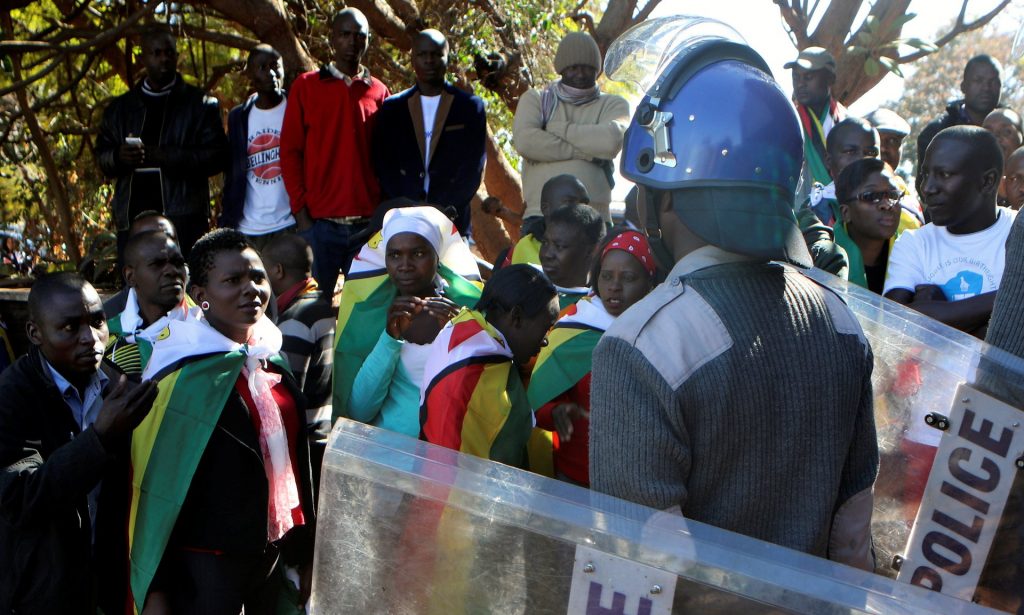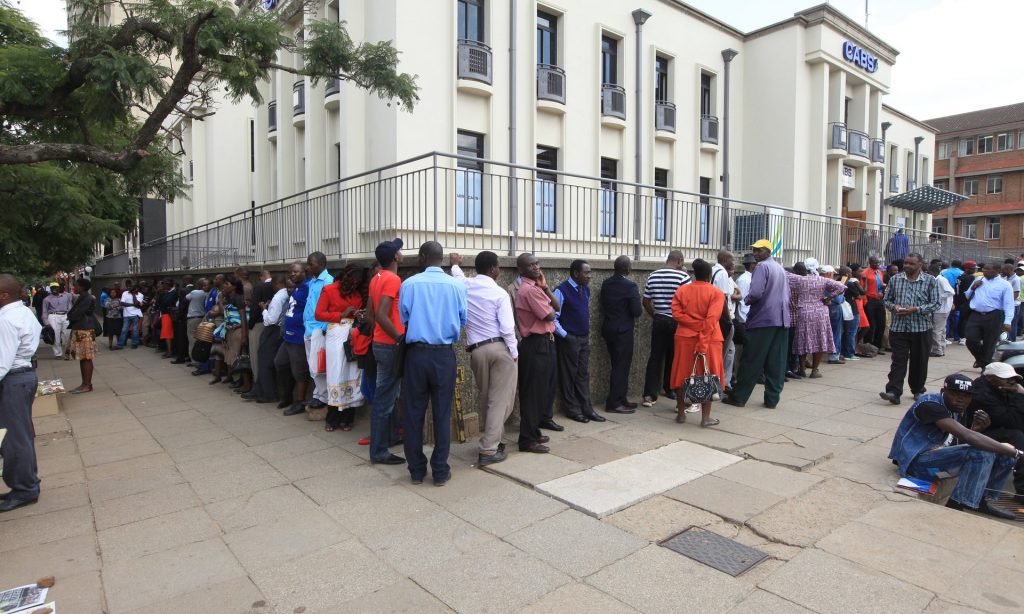
Photograph: Philimon Bulawayo/Reuters
For the past week Arnold Gambe, 76, has been trying to withdraw his government pension from the People’s Own Savings Bank in Harare.
Every morning he travels from his home, about 50km north of Zimbabwe’s capital, to try. He needs the money to buy painkillers for his back problems and medicine for his eight-year-old grandson, who is HIV positive.
But with Zimbabwe’s economy in meltdown and quickly running out of precious dollars, Gambe is just one of the many citizens who have been struggling to get their cash out of the bank.
“You go up and down to Harare and come back empty handed,” he says. “Some people sleep outside the banks as they can’t afford to travel.” Even when the banks do have dollars in stock, they impose strict withdrawal limits of $500 a week.
The mounting economic crisis has fuelled a wave of street protests, a national stay-away strike and a social media campaign against 92-year-old president Robert Mugabe’s government.
Zimbabwe’s health service in particular has been hit hard. There is a ban on commodity imports and civil servants, including nurses, joined the strike last week after the government failed to pay their salaries.
According to a local watchdog, Citizens Health Watch, 90% of healthcare institutions don’t have essential medicines in stock, and there have been sporadic shortages of antiretroviral (ARV) drugs, which are supposed to be free for HIV patients in public hospitals.
“Patients are [being] asked to buy from private pharmacies,” explains Mercy Bosha, programme manager at Citizens Health Watch. She estimates that most hospitals across the country are running at less than 30% capacity.
Espinah Matsanda, 66, is sitting in the waiting area in the Harare central hospital. She was injured last year when the taxi she was travelling in crashed into a ditch.
“At first, I thought I would just be treated for the minor injuries from the accident and discharged but the doctors discovered that I had diabetes and high blood pressure,” she says.
Matsanda now has to visit the hospital at least once a month, borrowing money for travel from her children, who work in South Africa.
“It has been difficult for me trying to make ends meet… the hospitals don’t have medication and I have to buy my drugs from private pharmacies for about $60 every month,” Matsanda adds.

Photograph: Tsvangirayi Mukwazhi/AP
Like other patients over 65, along with young children and pregnant women, Matsanda is not supposed to be paying for treatment.
According to government policy they should be entitled to free healthcare, but the health minister, David Parirenyatwa, recently admitted to parliament that this wasn’t happening.
Price disparities
Many Zimbabweans have also questioned why medicine is more expensive than in neighbouring countries.
A yellow fever vaccination may cost $66 in Zimbabwe but only $24 in Kenya, according a recent parliamentary debate, and reports from local newspapers have suggested that Zimbabweans in the north of the country have to “run with cooler boxes” to Zambia to buy blood for sick relatives because it’s cheaper there. In Zimbabwe, fees vary and appear to be decided on in an ad hoc manner.
Bosha says a seven-day course of the commonly used antibiotic Amoxicillin can cost up to $7, and a monthly supply of ARVs between $40 and $50. An HIV viral load blood examination, which is needed to determine whether patients are responding well to ARVs, can cost up to $30 at a private laboratory. Most public healthcare institutions don’t offer this service.
The medical system is in such disarray that nearly two-thirds of sick Zimbabweans do not seek out the treatment they need because they can’t afford it, according to the Ministry of Finance and Economic Development.
The squeeze is also being felt by the country’s more affluent citizens, too. Private doctors have reportedly been demanding cash up front from patients with medical insurance after claiming that they are not being paid or time, or being paid enough.
Across the board, funding for health is limited, warns Jane Muita, a UN representative in Zimbabwe. “If the cash shortages persist for a long time, that is when we are going to see some real challenges,” she says.
Gambe’s fruitless trips to the bank have driven him to desperate measures. “I ended up having to sell my oxen for $220, which is below the real market value of about $350 because I had to make sure we secured medication for the boy,” he says.
But the money didn’t last long, and with no more oxen to sell, the only option he has is to rejoin the banking queue in Harare.

